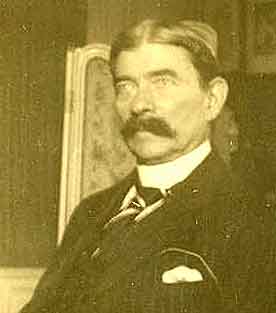Brick Garrigues, a twenty-five year old newspaper reporter in Los Angeles, continues his correspondence with his old friend, Fanny Strassman.
Fanny had returned to New York, and she began to move in an artistic crowd. She was wooed by many men, some eligible, most not.
One of them was Frank Harris, a controversial figure in both his life and his writings, whose autobiography had been published in three volumes between 1923 and 1927.
In 1928 Frank Harris was seventy-two years old.
|
Oct. 4, 1928 My dear Fanny, My dear girl, when Harris leered at you, why didn’t you flash your most engaging smile? Then your great-grandchildren might have boasted of an affair their beloved ancestor had with the man who wrote those three naughty books. Such a chance doesn’t come often, even in New York! More seriously, though, I’ve seldom been as bowled over by any book as I was his “Life.” I was so utterly amazed that I did something I suppose I’ll always be ashamed of — I sat down and wrote him a letter! I was surprised to get an answer a few days ago.
Strange that everybody who has known Harris speaks of him as having rather hateful, venomous personality. No doubt he has, toward those he considers his inferiors — and everybody except Jesus and Shakespeare he considers his inferiors in those aging days. But in his books and in his letter he seems to me to be the kindliest of men. There’s a real warmth of cordiality in his letter which I’m sure I should never waste upon an unknown correspondent. But the “Life” — ah, the “Life”! The Frank Harris he pictures, that he writes about — the literary character, I mean, who has nothing to do with the author — is a character as great as any in literature. I’m sure Harris, the character, is as great as Goethe’s Faust or as Don Quixote and much greater that Hamlet. Of course, Harris — the author — never realized that he was writing fiction, that is, that he was creating a character. He thought he was depicting one. Perhaps he was. But we can’t be interested in a nasty old man sitting alone in Nice, moaning because the world cannot appreciate him. We can be interested, however, in the man who took what he considered the sacred flame from the torch of Emerson, of Whitman, of Carlyle, who used it to light the pathway of Wilde and Dowson and a dozen others, and who now offers it to youth to carry on, only to have it refused because the torch is in the image of Priapos! There’s tragedy there, as there’s even deeper tragedy in the friend and patron of great artists, sitting alone in a generation which has turned its eyes in a different direction, dying in the sunlight, denied even the reflected glory with which he has managed to surround himself during his lifetime. I envy him tremendously for the tremendous life he has led, I pity him for its result, and I envy him again for his sure belief that he will be enshrined among the immortals — however ridiculous that belief may be. And who is Harris? An obscure writer, a journalist, a mere critic, perhaps. But his claim to brotherhood with the immortals perhaps will carry him along with the sacred band. It was that egotism which amazed me. The spirit of the man. For sixty years there’s nothing that he’s wanted that he could not have. A cowboy on the Texas plains. A poor journalist. A rich journalist. The adviser — the chestnut puller, if you will — of ministers. The friend of princes. The only man who stood shoulder to shoulder with Wilde. The comforter of Dowson. Life poured her gifts abundantly into his lap . . . To live, to fret out existence grasping at futile bubbles — and seizing them — to push forward toward the bunch of hay tied in front of the donkey’s nose, carrying, transporting the load the gods want carried somewhere else — and then to find at the end of the journey that the hay is only excelsior — that’s tragedy. . . . Of course, you wouldn’t like Harris. That’s probably why I’m devoting an entire letter to him. You couldn’t stand him. I can just imagine you trying to wade through the first volume! (Time out while I burst into laughter. You who were shocked at Fanny Hill!) Yet after the first ten pages I find it utterly impossible to consider it pornographic, or even daring. He discusses his affairs in the same spirit in which he discusses his stomach-pump. Oh, well. This letter wanders. Don’t read Harris then. Or perhaps read just one of his short stories. “A Daughter of Eve,” or “The Holy Stigmata.” The second I consider second only to “The Procurator of Judea” as the greatest short story ever written. But Harris was not an artist in words. Only in living. As ever, Brick |
•
| FRANK HARRIS 1856-1931 |
 |
| Click here for more information on Frank Harris |
•